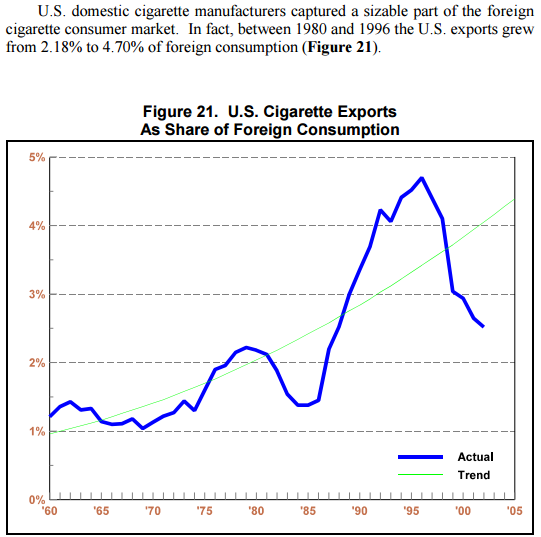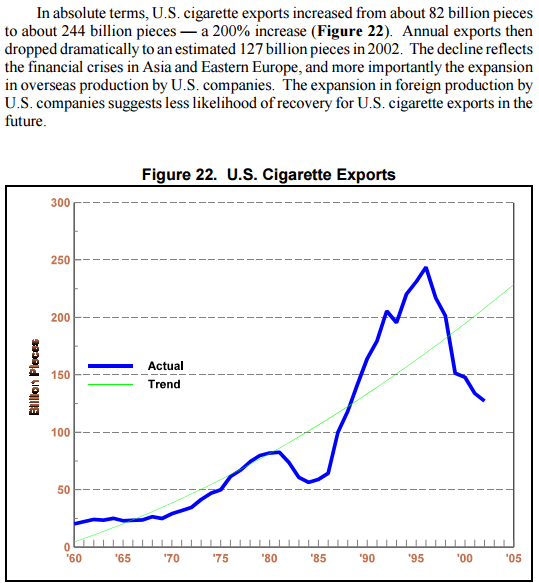America’s Colombian “Drug War” Herbicide Linked to Cancer. US Continues to Push World’s Most Lethal Drug: Tobacco

The Associated Press reports that “the world’s most-popular weed killer” has been discovered to be “a likely cause of cancer”:
The International Agency for Research on Cancer, a French-based research arm of the World Health Organization, has reclassified the herbicide glyphosate as a result of what it said is convincing evidence the chemical produces cancer in lab animals and more limited findings it causes non-Hodgkin’s lymphoma in humans.
…the glyphosate-containing herbicide Roundup [made by Monsanto] is a mainstay of industrial agriculture.
This has implications, AP continues, for the US “aerial spraying program in Colombia”:
[A] fumigation program, which is financed by the U.S. and partly carried out by American contractors [has sprayed] 4 million acres of land in the past two decades to kill coca plants, whose leaves are used to produce cocaine.
Colombia’s left likens [the program] to the U.S. military’s use of the Agent Orange herbicide during the Vietnam War.
In 2013, Colombia agreed to pay Ecuador $15 million to settle a lawsuit over economic and human damage tied to spraying along the countries’ border.
The US government has stated:
…damage to the environment and health risks from production of cocaine far outweigh the adverse effects of aerial eradication.
And, AP notes:
…the spraying program is operating as usual.
…
As the spraying of Columbia with known likely carcinogens is being carried out due to purported US hand-wringing over the adverse effects of drugs on humans, the US continues to push the world’s most lethal drug, tobacco:
The United States is consistently the world’s number 4 producer of tobacco.
In 2002, the US Department of Agriculture recorded that that US was the world’s number 2 exporter of tobacco, and that was after a steep decline in US exports, as noted below.
A report to Congress on “U.S. Tobacco Production, Consumption, and Export Trends” finds:
The report notes that US share of global tobacco exports has declined in recent years, but this only a “problem” for US manufacturers, not US cigarette corporations themselves, as they are simply shipping their manufacturing overseas:
The apparent lack of competitiveness of domestic cigarette manufacturers may be more of a problem for U.S. growers than for the manufacturers. Philip Morris, the largest domestic manufacturer is addressing the problem by acquiring foreign manufacturing plants. These foreign operations will likely be the source of cigarettes supplying the growing global demand for American-style cigarettes. As anecdotal evidence, Philip Morris claims in its 2002 Annual Report to stockholders a 3.5% increase in sales from its international operations. That increase pushed Philip Morris International’s total shipments (non-U.S.) to 723.1 billion cigarettes. In contrast, total U.S. output was 565 billion (22% less than Philip Morris off-shore production), and U.S. exports declined 5%.
The US uses its position of dominance to forcefully push its lethal drugs on weaker countries, including its “allies”:
A research paper on Tobacco Control reports:
The US Cigarette Export Association (USCEA), an association of US tobacco companies, successfully utilised the 1984 amendments to Section 301 of the 1974 Trade Act to enlist cooperation of the executive branch of the US government in threatening trade sanctions against countries in Asia where quotas, high tariffs, high retail taxes, and advertising and distribution restrictions on tobacco were alleged to unfairly limit the markets for US tobacco products.13 The challenge was especially harmful to youth and women, who had historically low rates of cigarette smoking. A Goverment Accountability Office study showed that smoking among South Korean male teens rose from 18.4% to 29.8% in a single year, and quintupled among teen women, rising from 1.6 to 8.7%.
The World Health Organization reports that tobacco is a:
Leading cause of death, illness, and impoverishment
The tobacco epidemic is one of the biggest public health threats the world has ever faced, killing nearly six million people a year. More than five million of those deaths are the result of direct tobacco use while more than 600 000 are the result of non-smokers being exposed to second-hand smoke. Approximately one person dies every six seconds due to tobacco, accounting for one in 10 adult deaths. Up to half of current users will eventually die of a tobacco-related disease.
Tobacco users who die prematurely deprive their families of income, raise the cost of health care and hinder economic development.
Tobacco caused 100 million deaths in the 20th century.
If current trends continue, it may cause one billion deaths in the 21st century.
Unchecked, tobacco-related deaths will increase to more than eight million per year by 2030.
Bans on tobacco advertising, promotion and sponsorship [like the ones the US uses threats to prevent, as noted above] can reduce tobacco consumption.
These alarming findings suggest that Colombia should immediately enter the US “war on drugs” and start spraying the US with carcinogenic chemicals to kill the tobacco leaves that are used to produce cigarettes. If Colombia can’t do it alone, perhaps an alliance of countries would be up to the task. Clearly, the benefits would far outweigh the adverse effects of aerial eradication and, as AP reports, while the “left” and “leftists” in the US might be against it, the program would have the support of the center, the right, and the US government.
While Colombia is here spraying, they might want to hit US fast food corporations and some other institutions, as well. Benefits will far outweigh the costs.
Robert Barsocchini is an author and UK-based colleague on Twitter. He is a contributor to Washington’s Blog and writes professionally for the film industry.



